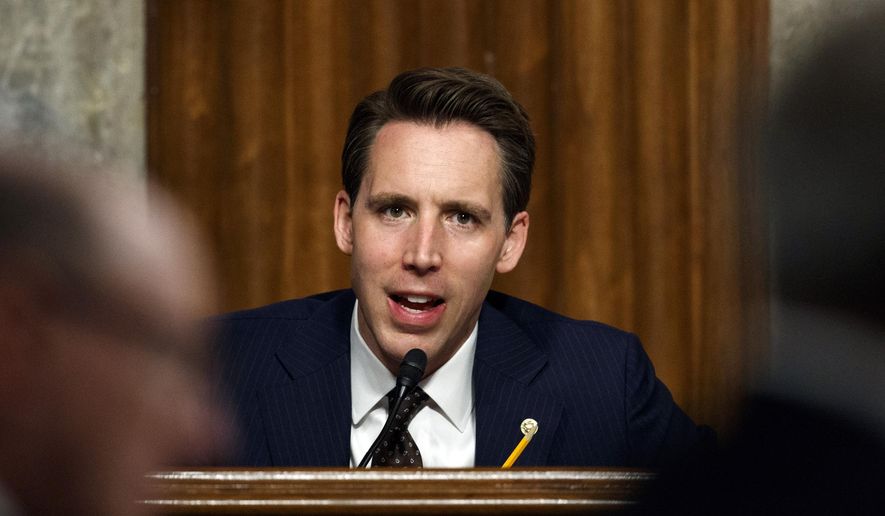OPINION:
It can be difficult to make out through the sound and fury (much of which, as the poet said, signifies nothing and is emitted by idiots) surrounding the presidency of Donald Trump, but “Trumpism” was once a coherent political philosophy.
Sovereignty was its lodestar, and it meant something along the lines of trade and immigration restrictions at the border, military restraint abroad, and nationalist projects like major infrastructure spending at home. There was the Teddy Roosevelt-inspired suspicion of big business (hardly inapplicable in the era of woke Nike) and of monopoly power too.
The president has implemented this agenda in fits and starts and with some success, though he’s been waylaid by the endless Russia probe and a judiciary that has blocked several key initiatives. Mr. Trump has also undermined his own cause with some bizarre personnel choices. The dovish Mr. Trump appointed uber-hawk John R. Bolton as his national security adviser. The lover of big infrastructure projects and self-styled “king of debt” made the green-eyeshades-donning Mick Mulvaney his chief of staff.
Yet there still exists a distilled form of “Trumpism,” and its purest expression may come in the form of the youngest member of the Senate.
Josh Hawley, a newly elected Republican from Missouri who has not yet rung in his 40th birthday, offers a coherent, thoughtful version of Trumpism — a vision of what Trumpism-sans-tweets looks like.
In an interview in his office on Capitol Hill recently, Mr. Hawley expounded on the political cause with which he has become most associated in his less than a year in the Senate: Reining in the power of the big tech companies like Facebook and Google.
As Mr. Hawley sees it, there are three big and interlocking problems with the tech companies and their ever-expanding reach: data privacy, censorship and anti-competitive conduct. He points out that each of these problems is only compounded by big tech’s sheer size.
The first problem with big tech, the senator says, is data privacy, or the lack thereof — specifically the collection and selling of data “without user consent.” As Mr. Hawley sees it, Americans are unaware of the extraordinary hoovering of data that big tech is engaged in each day.
“Take the Android phone,” he says. “No reasonable consumer would think that when they turn the phone off, or they turn the location services off or that they turn Wi-Fi off that the phone is still scanning Wi-Fi networks and sending that information to Google. Nobody would think that.”
Reasonable consumers would be wrong, of course: Android absolutely continues to scan and send data to Google even when location services and Wi-Fi are turned off.
Mr. Hawley’s proposed remedy for this is simple: Give users the ability to opt out of tracking. His Do Not Track Act, which he introduced this year, is modeled on the Do Not Call List, which allows Americans to opt out of telemarketing phone calls.
More controversial is Mr. Hawley’s proposal for combatting what he calls the “censorship of conservative views” on big tech platforms. The senator wants to reform what he calls the Section 230 “carveout,” which offers immunity from traditional liability laws. Basically, that carveout ensures that big tech companies are not liable for content posted on their platforms. It’s a form of immunity that radio stations, TV networks, and newspapers like this one do not enjoy.
The bill, which applies only to the largest platforms, would remove “the immunity big tech companies receive under Section 230 unless they submit to an external audit that proves by clear and convincing evidence that their algorithms and content-removal practices are politically neutral,” Mr. Hawley says, arguing that by censoring content, big tech companies are acting more like traditional publishers and their Section 230 immunity is therefore unjustified.
Lastly, Mr. Hawley worries that “anti-competitive conduct” has turned the big tech companies into quasi-monopolies. He points out that incumbents “buy up [their] biggest competitors, or game the patent system, suppressing innovation.”
Mr. Hawley couches his argument in the language of free markets and competition. “Markets where you have monopoly-size businesses that are leveraging their market power are not well functioning markets,” he says.
He supports the DOJ and FTC investigating the issue and adds that “any steps that Congress takes should be pro-competitive.” Mr. Hawley points that the rate of new business start ups is historically low — hardly a sign of a pro-competitive environment.
Mr. Hawley is a hawk on immigration, too. In our interview, he called the Democrats “deranged” for their utter unwillingness to work toward quelling the crisis at the U.S-Mexican border.
And what is Trumpism, after all, without a little political invective thrown in every now and again?
• Ethan Epstein is deputy opinion editor of The Washington Times. Contact him at eepstein@washingtontimes.com or on Twitter @ethanepstiiiine.




Please read our comment policy before commenting.